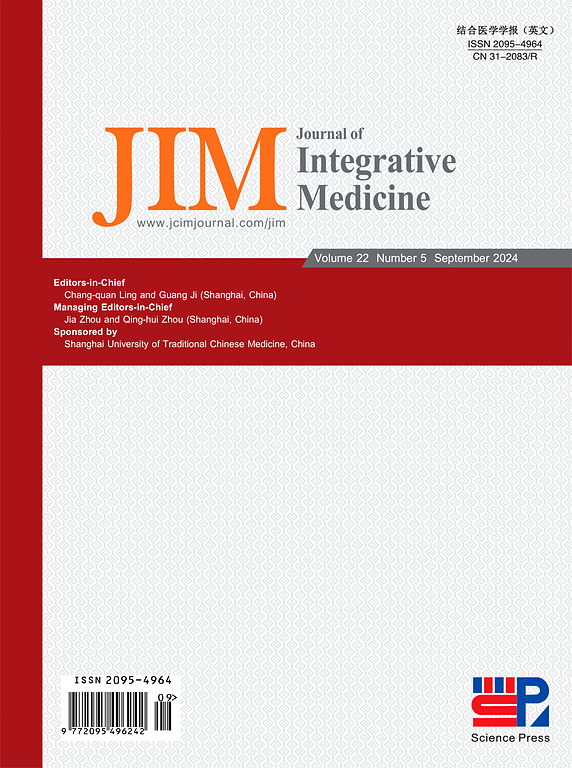Efficacy and safety of acupuncture therapies for adult patients with mild and moderate major depressive disorder: A systematic review and meta-analysis
IF 4
2区 医学
Q1 INTEGRATIVE & COMPLEMENTARY MEDICINE
引用次数: 0
Abstract
Background
Acupuncture therapy provides a complementary and alternative approach to treating major depressive disorder (MDD), but its efficacy and safety have still not been comprehensively assessed. Recently published systematic reviews remain confusing and inconclusive.
Objective
This systematic review evaluated the efficacy and safety of acupuncture therapy alone or combined with antidepressants for adult patients with mild and moderate MDD.
Search strategy
Chinese Biomedical Literature Database, China National Knowledge Infrastructure Database, Wanfang Database, Chinese Science and Technology Journal Database, PubMed, Embase, and Cochrane Library were searched from their inceptions to March 2025.
Inclusion criteria
Randomized controlled trials that compared acupuncture therapy with antidepressants, or acupuncture therapy plus antidepressants with acupuncture therapy or antidepressants for adult patients with mild and moderate MDD were included.
Data extraction and analysis
Five reviewers independently extracted data from original literature using a standardized form, and the data were verified by two reviewers to ensure accuracy. Statistical meta-analyses, publication bias analyses, and subgroup analyses were performed by using Review Manager 5.3 software. The Grading of Recommendations Assessment, Development, and Evaluation approach was used to assess the certainty of the evidence.
Results
A total of 60 eligible studies including 4675 participants were included. Low-certainty evidence showed that compared with antidepressants, acupuncture therapy (standardized mean difference [SMD] = –0.57; 95% confidence interval [CI] = [–0.87, –0.27]; I2 = 86%; P = 0.006) or acupuncture therapy plus antidepressants (SMD = –1.00; 95% CI = [–1.18, –0.81]; I2 = 77%; P < 0.00001) may reduce the severity of depression at the end of treatment. Low-certainty evidence indicated that compared with acupuncture therapy alone, acupuncture therapy plus antidepressants slightly reduced the severity of depression at the end of treatment (SMD = –0.38; 95% CI = [–0.61, –0.14]; I2 = 18%; P = 0.002). Similar results were also found for acupuncture’s relief of insomnia. The reported adverse effects of acupuncture therapy were mild and transient. For most of the subgroup analyses, acupuncture type, scale type, and the course of treatment did not show a significant relative effect.
Conclusion
Acupuncture therapy may provide antidepressant effects and relieve insomnia with mild adverse effects for adult patients with mild and moderate MDD. But the certainty of evidence was very low. More high-quality, well designed, large-scale studies with long-term follow-up are needed in the future.
Please cite this article as: Kuang HJ, Yang HS, Feng YX, Tang H, Fan Q, Xu YQ, Cui S, Musil R, Luxenburger H, Zhang YX, Zhao H, Zhang YQ. Efficacy and safety of acupuncture therapies for adult patients with mild and moderate major depressive disorder: A systematic review and meta-analysis. J Integr Med. 2025; 23(5):471–491.
针灸治疗成人轻、中度重度抑郁症的疗效和安全性:一项系统综述和荟萃分析。
背景:针刺疗法是治疗重度抑郁症(MDD)的一种补充和替代方法,但其疗效和安全性尚未得到全面评估。最近发表的系统综述仍然令人困惑,也没有定论。目的:本系统评价针刺治疗单独或联合抗抑郁药治疗成人轻中度重度抑郁症的疗效和安全性。检索策略:检索中国生物医学文献数据库、中国国家知识基础数据库、万方数据库、中国科技期刊数据库、PubMed、Embase、Cochrane图书馆自成立至2025年3月。纳入标准:纳入比较针灸治疗与抗抑郁药,或针灸治疗加抗抑郁药与针灸治疗或抗抑郁药治疗轻中度重度抑郁症成人患者的随机对照试验。数据提取与分析:5名审稿人采用标准化表格,独立从原始文献中提取数据,并由2名审稿人对数据进行验证,确保数据的准确性。采用Review Manager 5.3软件进行统计荟萃分析、发表偏倚分析和亚组分析。建议分级评估、发展和评价方法用于评估证据的确定性。结果:共纳入60项符合条件的研究,包括4675名受试者。低确定性证据显示,与抗抑郁药相比,针灸治疗(标准化平均差[SMD] = -0.57;95%置信区间[CI] = [-0.87, -0.27];i2 = 86%;P = 0.006)或针灸治疗加抗抑郁药(SMD = -1.00;95% ci = [-1.18, -0.81];i2 = 77%;p 2 = 18%;p = 0.002)。针灸对失眠的缓解也发现了类似的结果。报道的针灸治疗的不良反应是轻微和短暂的。在大多数亚组分析中,针刺类型、量表类型和治疗过程没有显示出显著的相对影响。结论:针刺疗法对成人轻中度重度抑郁症患者具有抗抑郁、缓解失眠的作用,不良反应轻微。但证据的确定性非常低。未来需要更多高质量、设计良好、大规模的长期随访研究。本文署名:匡海军,杨海生,冯永祥,唐辉,樊强,徐永强,崔思,穆斯瑞,卢森伯格,张永祥,赵宏,张永强。针灸治疗成人轻、中度重度抑郁症的疗效和安全性:一项系统综述和荟萃分析。集成医学[J];打印前Epub。
本文章由计算机程序翻译,如有差异,请以英文原文为准。
求助全文
约1分钟内获得全文
求助全文
来源期刊

Journal of Integrative Medicine-Jim
Medicine-Complementary and Alternative Medicine
CiteScore
9.20
自引率
4.20%
发文量
3319
期刊介绍:
The predecessor of JIM is the Journal of Chinese Integrative Medicine (Zhong Xi Yi Jie He Xue Bao). With this new, English-language publication, we are committed to make JIM an international platform for publishing high-quality papers on complementary and alternative medicine (CAM) and an open forum in which the different professions and international scholarly communities can exchange views, share research and their clinical experience, discuss CAM education, and confer about issues and problems in our various disciplines and in CAM as a whole in order to promote integrative medicine.
JIM is indexed/abstracted in: MEDLINE/PubMed, ScienceDirect, Emerging Sources Citation Index (ESCI), Scopus, Embase, Chemical Abstracts (CA), CAB Abstracts, EBSCO, WPRIM, JST China, Chinese Science Citation Database (CSCD), and China National Knowledge Infrastructure (CNKI).
JIM Editorial Office uses ThomsonReuters ScholarOne Manuscripts as submitting and review system (submission link: http://mc03.manuscriptcentral.com/jcim-en).
JIM is published bimonthly. Manuscripts submitted to JIM should be written in English. Article types include but are not limited to randomized controlled and pragmatic trials, translational and patient-centered effectiveness outcome studies, case series and reports, clinical trial protocols, preclinical and basic science studies, systematic reviews and meta-analyses, papers on methodology and CAM history or education, conference proceedings, editorials, commentaries, short communications, book reviews, and letters to the editor.
Our purpose is to publish a prestigious international journal for studies in integrative medicine. To achieve this aim, we seek to publish high-quality papers on any aspects of integrative medicine, such as acupuncture and traditional Chinese medicine, Ayurveda medicine, herbal medicine, homeopathy, nutrition, chiropractic, mind-body medicine, taichi, qigong, meditation, and any other modalities of CAM; our commitment to international scope ensures that research and progress from all regions of the world are widely covered. These ensure that articles published in JIM have the maximum exposure to the international scholarly community.
JIM can help its authors let their papers reach the widest possible range of readers, and let all those who share an interest in their research field be concerned with their study.
 求助内容:
求助内容: 应助结果提醒方式:
应助结果提醒方式:


